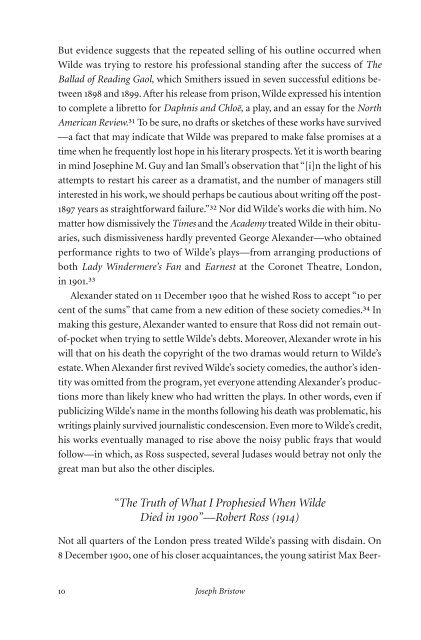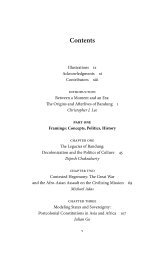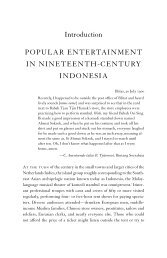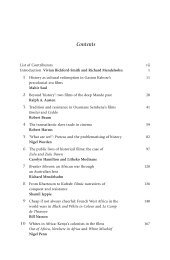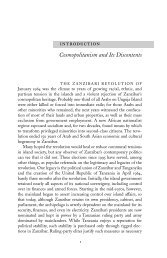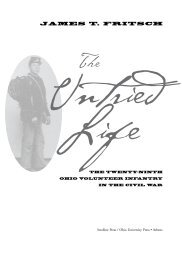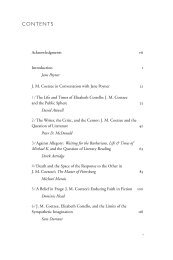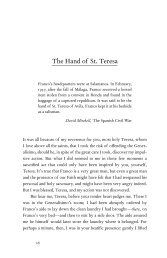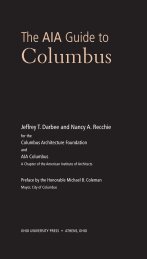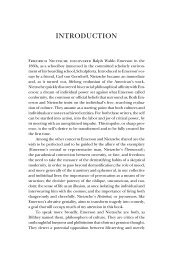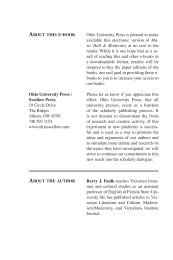Oscar Wilde and Modern Culture - Ohio University Press & Swallow ...
Oscar Wilde and Modern Culture - Ohio University Press & Swallow ...
Oscar Wilde and Modern Culture - Ohio University Press & Swallow ...
You also want an ePaper? Increase the reach of your titles
YUMPU automatically turns print PDFs into web optimized ePapers that Google loves.
But evidence suggests that the repeated selling of his outline occurred when<br />
<strong>Wilde</strong> was trying to restore his professional st<strong>and</strong>ing after the success of The<br />
Ballad of Reading Gaol, which Smithers issued in seven successful editions between<br />
1898 <strong>and</strong> 1899. After his release from prison, <strong>Wilde</strong> expressed his intention<br />
to complete a libretto for Daphnis <strong>and</strong> Chloë, a play, <strong>and</strong> an essay for the North<br />
American Review.³₁ To be sure, no drafts or sketches of these works have survived<br />
—a fact that may indicate that <strong>Wilde</strong> was prepared to make false promises at a<br />
time when he frequently lost hope in his literary prospects. Yet it is worth bearing<br />
in mind Josephine M. Guy <strong>and</strong> Ian Small’s observation that “[i]n the light of his<br />
attempts to restart his career as a dramatist, <strong>and</strong> the number of managers still<br />
interested in his work, we should perhaps be cautious about writing off the post-<br />
1897 years as straightforward failure.”³² Nor did <strong>Wilde</strong>’s works die with him. No<br />
matter how dismissively the Times <strong>and</strong> the Academy treated <strong>Wilde</strong> in their obituaries,<br />
such dismissiveness hardly prevented George Alex<strong>and</strong>er—who obtained<br />
performance rights to two of <strong>Wilde</strong>’s plays—from arranging productions of<br />
both Lady Windermere’s Fan <strong>and</strong> Earnest at the Coronet Theatre, London,<br />
in 1901.³³<br />
Alex<strong>and</strong>er stated on 11 December 1900 that he wished Ross to accept “10 per<br />
cent of the sums” that came from a new edition of these society comedies.³⁴ In<br />
making this gesture, Alex<strong>and</strong>er wanted to ensure that Ross did not remain outof-pocket<br />
when trying to settle <strong>Wilde</strong>’s debts. Moreover, Alex<strong>and</strong>er wrote in his<br />
will that on his death the copyright of the two dramas would return to <strong>Wilde</strong>’s<br />
estate. When Alex<strong>and</strong>er first revived <strong>Wilde</strong>’s society comedies, the author’s identity<br />
was omitted from the program, yet everyone attending Alex<strong>and</strong>er’s productions<br />
more than likely knew who had written the plays. In other words, even if<br />
publicizing <strong>Wilde</strong>’s name in the months following his death was problematic, his<br />
writings plainly survived journalistic condescension. Even more to <strong>Wilde</strong>’s credit,<br />
his works eventually managed to rise above the noisy public frays that would<br />
follow—in which, as Ross suspected, several Judases would betray not only the<br />
great man but also the other disciples.<br />
“The Truth of What I Prophesied When <strong>Wilde</strong><br />
Died in 1900”—Robert Ross (1914)<br />
Not all quarters of the London press treated <strong>Wilde</strong>’s passing with disdain. On<br />
8 December 1900, one of his closer acquaintances, the young satirist Max Beer-<br />
10 Joseph Bristow


